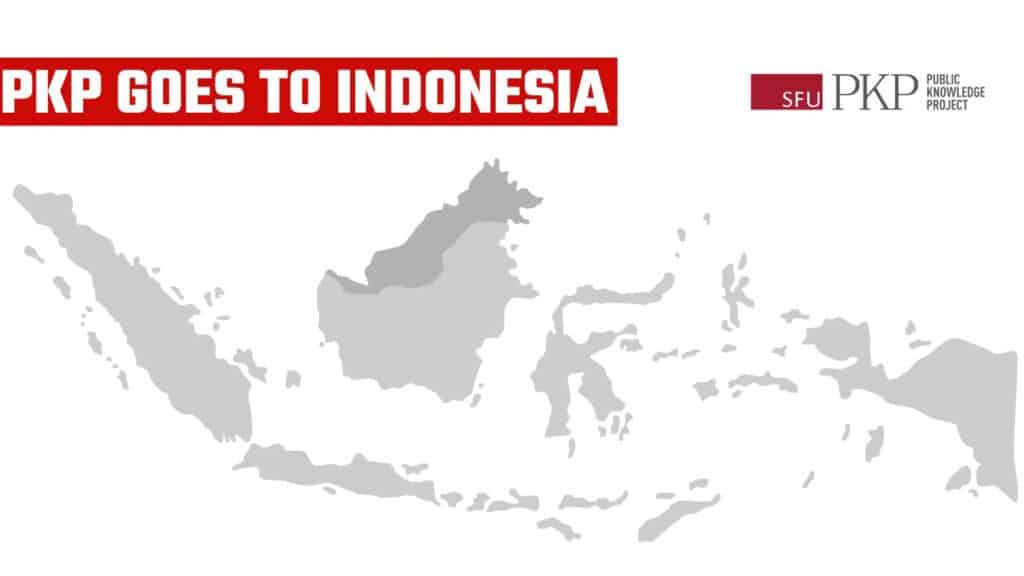
PKP is set to engage in a series of events this August in Indonesia that will bring together Open Journal Systems (OJS) users, Crossref, UGM, and RJI for workshops on upgrading, interoperability, networking, plugin, and metadata.
You may remember our Community Engagement and Outreach Librarian, Urooj Nizami, who shared the “Country Feature: ORCID and OJS in Indonesia” via PKP’s newsletter, Archipelago. Urooj told the story of how our relationship with Indonesian scholarly publishing communities, the largest OJS user base in the world, has been unfolding.
To add to this story, for those who have not learned yet, we would like to take this opportunity to introduce Maria Lamury, our first Local Liaison in Jakarta, Indonesia. Maria has been working with scholarly journals for the past 7 years, and brings with her expertise around OJS and information technology for libraries.
As a result of Maria’s efforts in the Local Liaison role, this August event series has come together as a partnership with contributions from Crossref, University of Gadjah Mada (UGM), and Relawan Jurnal Indonesia (RJI).
Importance of Supporting Upgrades and Plugins
The importance of supporting upgrades from OJS 2 to 3 and beyond cannot be emphasized enough. There are still many journals on OJS 2 globally, often because of upgrading challenges due to resource gaps and limited technical capacities.
Staying with older versions may pose problems for a journal’s stability and security. Therefore, PKP’s support in upgrading will positively impact journal development, functionality, discoverability, and regional contexts.
There are many excellent reasons to consider upgrading sooner, rather than later:
- Security first: Running unsupported or retired versions of OJS can leave your journal open to malicious attacks. Outdated versions of the software may have known vulnerabilities that can be exploited.
- Save time and resources in the future: As versions age, they may no longer be compatible with the server environment of your hosting organization. As those systems (PHP, MYSQL, etc) are upgraded, old versions of OJS may no longer work or will have a more difficult upgrade path.
- Get better features: Newer versions are more functional and efficient, and offer dramatic improvements in usability and performance. These changes can help make life easier, and save time, for journal managers, editors and authors, and also for the technical support teams managing the software.
- Easier planning: With an LTS (Long-Term Support) policy in place, time-crunched journals and organizations which may struggle with frequent upgrades can rely on a more predictable upgrade schedule, allowing for better planning.
Plugins add features, functionality, and interoperability with other services. For example, plugins can add fields to forms, change templates, save new information, exchange information, modify authentication procedures, create new pages or change existing screens in the application.
In PKP’s Plugin Guide, there is a Plugin Gallery where users will find plugins that will enhance their journal functionality, discoverability, interoperability and more, such as:
- COUNTER Reports
- Crossref Reference Linking & XML Export Plugin
- Datacite Export
- DOAJ Export
- DOI
- OpenAIRE
- ORCID Profile
- PKP Preservation Network (PKP PN)
- Research Organization Registry (ROR)
- and much more
Crossref in Jakarta, August 19 – 20
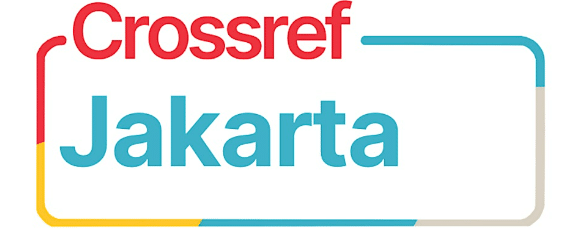
Crossref is hosting a two-day in-person event at the Aryaduta Menteng in Jakarta on 19-20 August.
At this free-to-attend event, journal managers and editors will have the opportunity to connect with Crossref staff, members, sponsors, ambassadors, and the community. PKP will also be present for discussions on working with OJS.
What will be covered:
- Our Mission and overview of Crossref services
- Creating the Research Nexus
- Increasing publication visibility with quality metadata
- Participating as a Crossref member
- OJS plugins and adding more metadata
- Retrieving metadata
We will also hold workshops focusing on a variety of topics such as Crossref Participation Reports, OJS, and the integrity of the scholarly record.
OJS Upgrading & Plugin Workshops, Jakarta, August 20
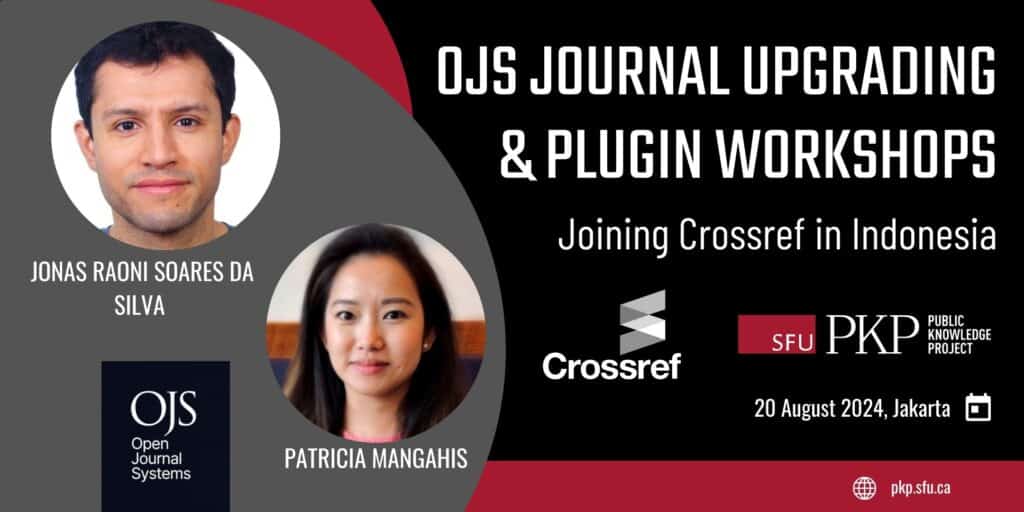
On Tuesday, August 20th, as part of the Crossref event in Jakarta, PKP will facilitate two workshops – one on OJS upgrading and one on plugins.
The OJS upgrading workshop will entail 3 hours with 50 system administrators, programmers, and research representatives, and is intended to upgrade the journals that are using OJS version 2.X to OJS version 3.3.0 so they can experience the new publishing features and important new security measures.
The workshop will also include plenty of information that will address other upgrades including 3.1. to 3.4. In essence, participants will learn how to upgrade, as well as take away key steps that can be used to tutor other system administrators.
Leading the workshop will be Jonas Raoni Soares da Silva, PKP Systems Developer. Jonas has developed, maintained, and contributed to some key services for PKP, such as the PKP Index (now retired), Beacon data, and PKP Preservation Network (PKP PN). He also contributes to the development of PKP applications and works closely with PKP Publishing Services (PKP PS) hosted clients helping them realize their development projects.
The OJS plugin session is intended to “help members understand the value of quality metadata and learn how they can register as much metadata as possible using OJS,” says Susan Collins, Crossref Community Engagement Manager.
Leading the plugin session will be Patricia Mangahis, PKP Client Services Manager. Patricia joined PKP in 2019, and brings with her almost a decade of knowledge and experience working with scholarly journals.
What will be covered:
- What are plugins?
- Types of plugins
- Checking for Compatibility
- Installing Plugins
- OJS / Crossref Plugins
- DOI Plugin
- Deposit Plugin
- Reference Linking
- Funding Plugin
- Scopus / Crossref Citation Plugin
OJS Workshop, Yogyakarta, August 22
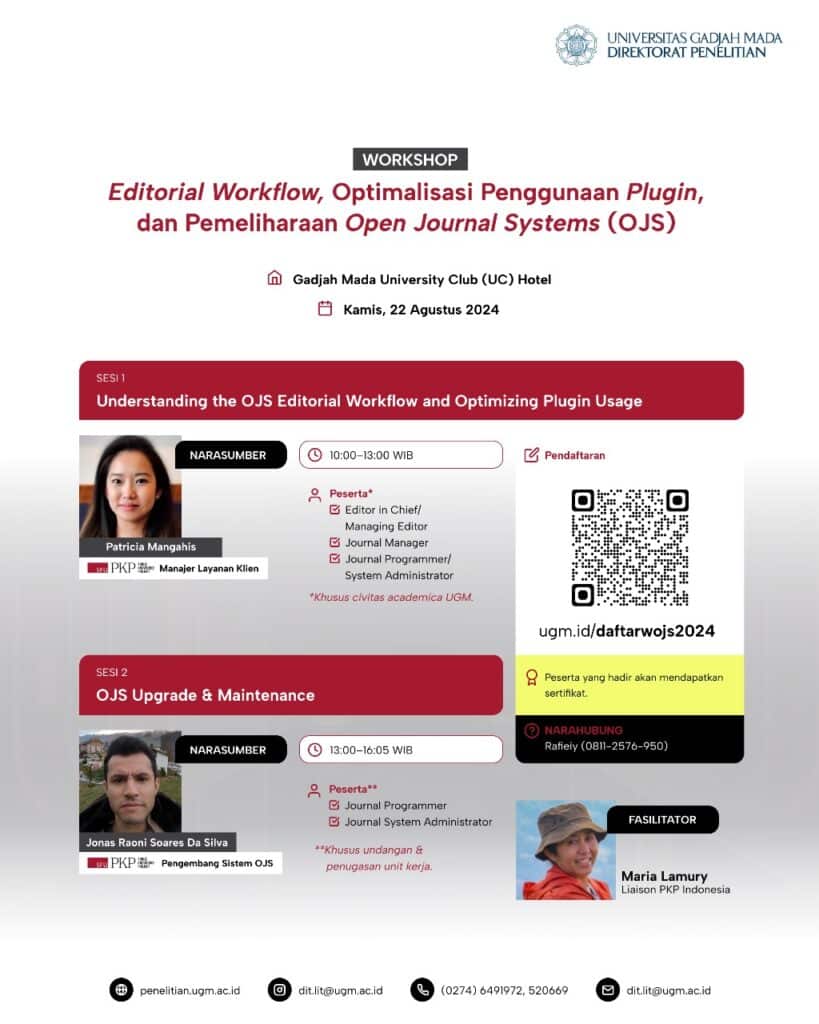
This event, hosted by University of Gadjah Mada (UGM), August 22nd, 2024, will be held exclusively for the editors, journal managers and system administrator for journals maintained by UGM.
The purpose of the workshops, which are expected to have 200 participants overall, is “to enhance the capabilities of journal teams in managing the editorial process, maximizing plugin usage, and maintaining the stability of the OJS system,” says Dr. Mirwan Ushada, Director of Research at UGM.
OJS Upgrading and Editorial Workflow, Makassar, August 24
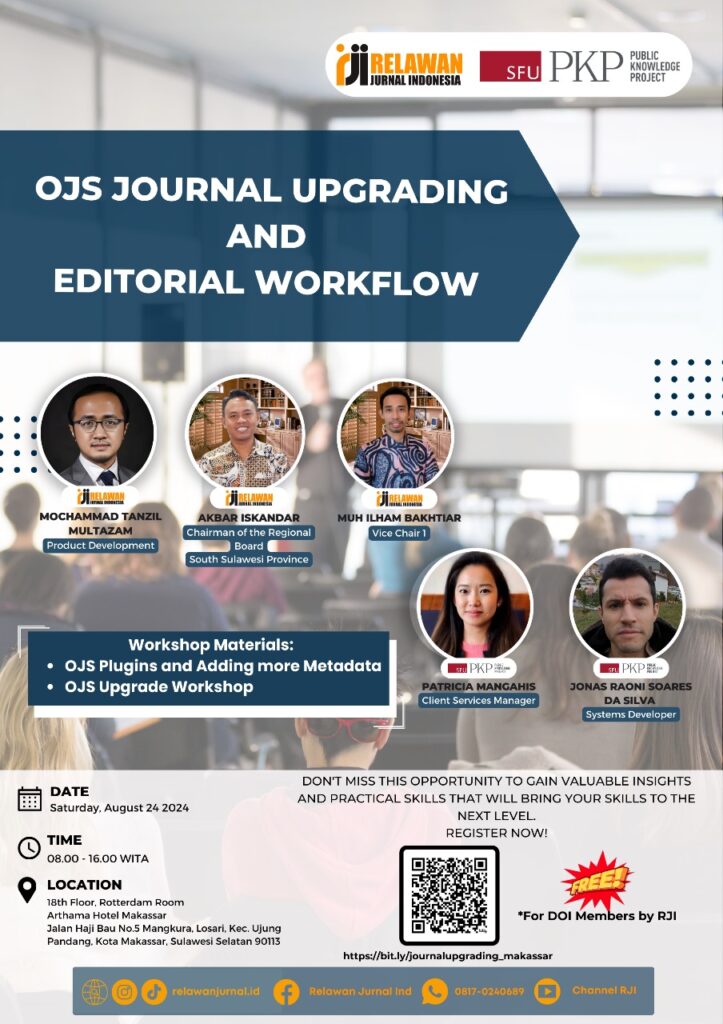
This final event of the series will be hosted by Relawan Jurnal Indonesia (RJI) at the Arthama Hotel Makassar, geared toward the universities in Sulawesi. The theme of the event is “OJS Journal Upgrading and Editorial Workflow.” About 100 participants are registered for this event.
The speakers will include:
- Patricia Mangahis, Client Services Manager, Public Knowledge Project (PKP)
- Jonas Raoni Soares Da Silva, Systems Developer, PKP
- Mochammad Tanzil Multazam, Product Development, Relawan Jurnal Indonesia (RJI)
- Muh Ilham Bakhtiar, Vice Chair 1, RJI
- Akbar Iskandar, Chairman of the Regional Board – South Sulawesi Province, RJI
Please stay tuned for workshop materials and recordings that will be shared after the event!
While these current events are full, for more information, or to inquire about collaborating on community events like these ones in your region, please contact commpkp@sfu.ca.
